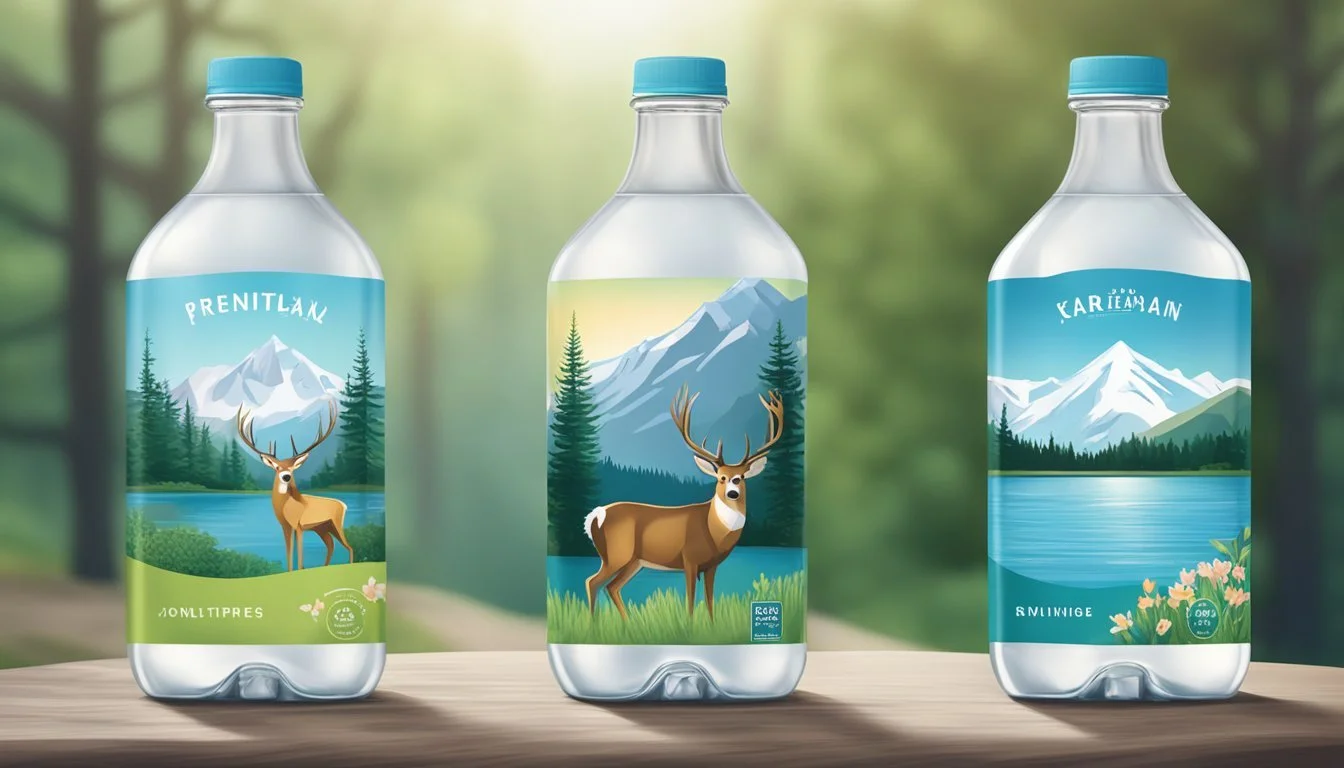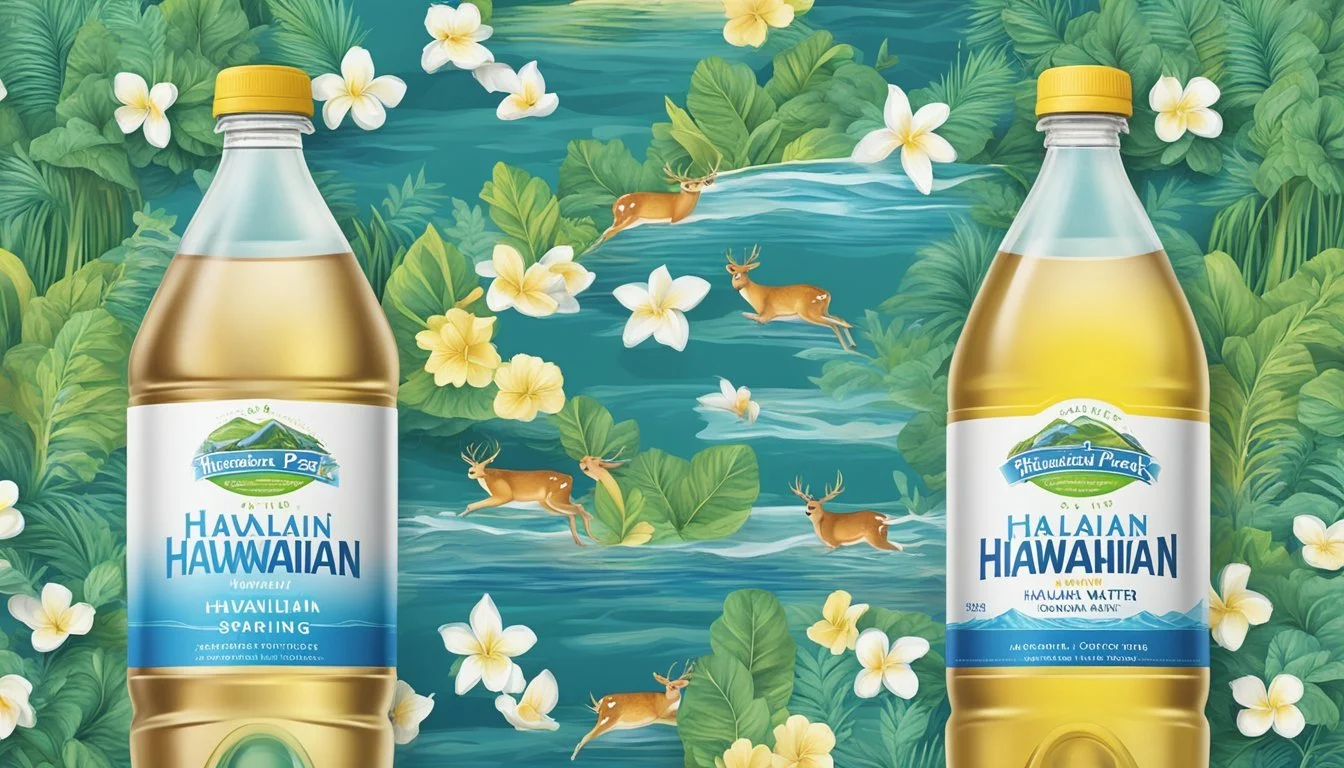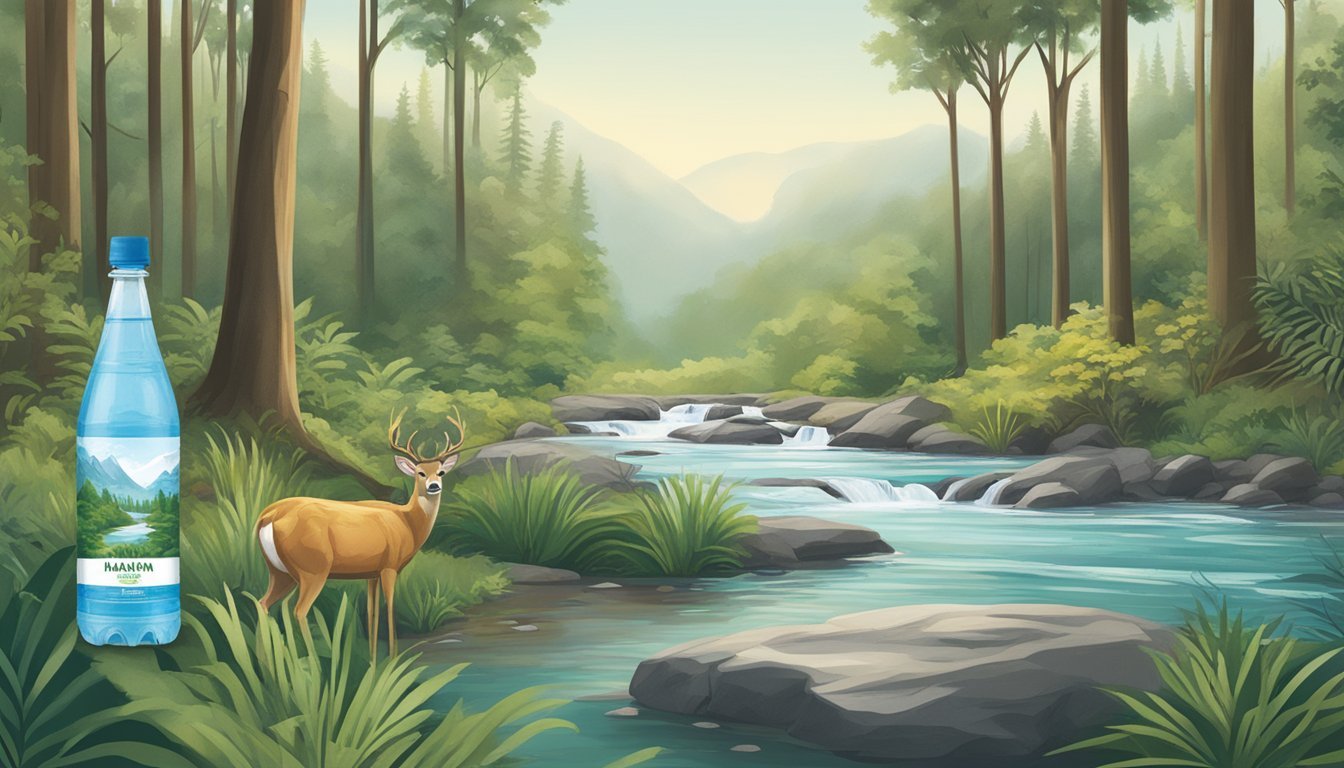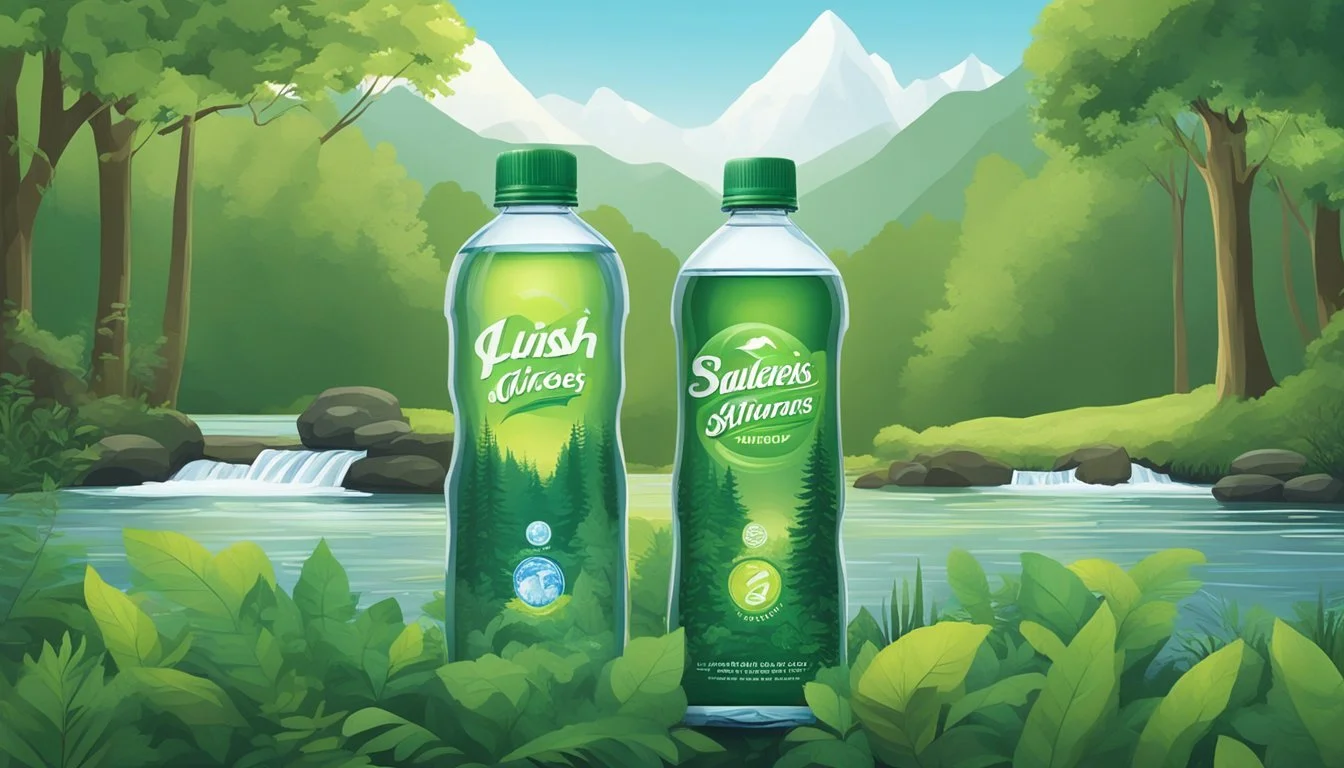Deer Park vs. Hawaiian Springs
Ultimate Bottled Water Showdown
Choosing the best bottled water often comes down to preference and perception of quality. Deer Park, a well-known brand, sources its water from natural springs across the Eastern Seaboard, and has built a reputation for its crisp and clean taste. Hawaiian Springs, on the other hand, offers water sourced from the Big Island of Hawaii, noted for its pure, volcanic filtration process.
When it comes to purity and taste, both brands offer unique qualities that might capture different consumer preferences. Deer Park boasts a long history, having bottled water since 1873, thus establishing a strong trust in their natural spring sources. Conversely, Hawaiian Springs emphasizes the pristine nature of Hawaii's landscape, providing a refreshing experience that many find unparalleled.
In the battle between Deer Park and Hawaiian Springs, the choice boils down to whether you prefer the traditionally trusted and widely available spring water from Deer Park or the exotic, naturally filtered taste of Hawaiian Springs. Both brands bring their own unique strengths to the table, making the decision ultimately subjective based on individual taste and brand loyalty.
Comparing Sources of Water
Deer Park and Hawaiian Springs both source their water from natural springs, but their origins and purification processes differ. Understanding these distinctions helps highlight the unique qualities and environmental impacts of each brand.
Natural Spring Water Origins
Deer Park sources its water primarily from springs located in the Appalachian Mountains. The spring water is naturally filtered through layers of earth, creating a refreshing and clean taste. This region is known for its rich groundwater sources, contributing to the consistent quality of Deer Park water.
Hawaiian Springs obtains its water from the Kea'au aquifer on the Big Island of Hawaii. This area is renowned for its volcanic rocks, which provide a natural filtration system. The water passes through these porous rocks, gaining unique minerals that contribute to its distinctive taste and purity.
Both brands emphasize their use of 100% natural spring water, which is crucial for maintaining natural taste and mineral content. The differing geographic locations of the sources lead to variations in water composition and flavor profiles.
Purification and Bottling Processes
Deer Park follows stringent purification methods to ensure the safety and quality of its water. The water undergoes multiple filtration stages, including carbon filtration and UV light treatment. These processes remove impurities while preserving the natural minerals from the spring, guaranteeing a crisp and refreshing drink.
Hawaiian Springs utilizes a method that maintains the water in its most natural state. Their process includes minimal filtration to retain the beneficial minerals and distinctive taste that the volcanic rocks impart. The water is bottled at the source, minimizing the risk of contamination and ensuring freshness.
Both brands use sustainable practices to minimize environmental impact. Deer Park emphasizes eco-friendly bottling and reduced plastic usage, while Hawaiian Springs focuses on preserving the natural environment of the Kea'au aquifer. They both prioritize sustainability to ensure the longevity of their water sources and the surrounding ecosystems.
Health and Safety Standards
When comparing Deer Park and Hawaiian Springs bottled water, both brands must adhere to regulatory standards to ensure their products are safe for consumption. These regulations focus on health and safety protocols established by both the FDA and EPA.
FDA Regulations and Compliance
The Food and Drug Administration (FDA) is responsible for monitoring and regulating bottled water in the United States. The FDA classifies bottled water as a food product and enforces strict standards to maintain its safety and quality.
Each brand, including Deer Park and Hawaiian Springs, must comply with these regulations to ensure their water is free from harmful contaminants. Bottled water that meets FDA standards undergoes rigorous testing processes for microbial, chemical, and radiological contaminants.
Additionally, the FDA requires bottled water companies to regularly submit quality reports detailing their findings. This ensures ongoing compliance and helps maintain high safety standards. The uniformity in testing protocols allows consumers to trust that the bottled water they purchase is safe for consumption.
Environmental Protection Agency Guidelines
The Environmental Protection Agency (EPA) sets guidelines for public drinking water, some of which are also referenced by the FDA for bottled water standards. These guidelines focus on protecting human health by limiting the amounts of specific contaminants in water resources.
Deer Park and Hawaiian Springs both adhere to these EPA guidelines to ensure their bottled water is not only clean but also safe to drink. The EPA guidelines cover a range of potential contaminants, including PFAS chemicals, which have been a concern in recent studies.
Compliance with EPA standards requires regular testing and reporting on water quality. By adhering to these guidelines, both Deer Park and Hawaiian Springs demonstrate their commitment to providing safe products that meet or exceed federal health and safety regulations.
Chemical Composition and Quality
Deer Park and Hawaiian Springs offer distinct qualities in their bottled water, with key differences in mineral content, potential contaminants, and quality assurance testing.
Mineral Content Analysis
Deer Park sources its water from springs along the Eastern Seaboard of the United States, providing natural spring water that contains minerals such as calcium, magnesium, and potassium. These naturally occurring minerals contribute to both the flavor and potential health benefits of the water.
Hawaiian Springs water is sourced from a volcanic well in Hawaii and is praised for its naturally alkaline properties. Its unique mineral composition includes electrolytes and essential minerals, credited with enhancing both taste and hydration. The pH level of Hawaiian Springs ranges from 7.6 to 8.2, indicating its alkaline nature.
Presence of Contaminants
Deer Park adheres to strict guidelines for contaminant levels. Regular tests ensure that the water does not contain harmful amounts of substances like lead or PFAS chemicals. Despite being sourced from multiple springs, the company maintains stringent quality controls to ensure consumer safety.
Hawaiian Springs boasts of high purity due to the isolated location of its source. The volcanic filtration process is natural and helps in minimizing contaminants. Tests frequently show low levels of undesirable substances, aligning with their reputation for clean, pure water.
Quality Assurance Testing
Deer Park employs a rigorous purification process and conducts frequent quality assurance tests. These tests include screening for chemical contaminants, microbial agents, and ensuring the mineral content meets specified standards. The brand emphasizes transparency and reliability in their purification practices.
Hawaiian Springs also prioritizes quality and purity. Their water is bottled directly at the source, which enhances freshness and maintains the natural mineral makeup. Regular quality checks are performed to ensure that the water remains free from contaminants and retains its beneficial qualities.
Both brands are committed to high standards of quality and safety, yet each offers a different composition and taste profile based on their unique sources and processing methods.
Taste and Hydration Experience
The comparison between Deer Park and Hawaiian Springs bottled waters highlights significant differences in flavor, pH balance, and hydration experience. These differences influence one's preference for either brand as a daily drinking water choice.
Flavor Profile Comparison
Deer Park water is known for its crisp and refreshing taste, coming from natural springs in the eastern United States. It offers a clean profile with a slightly earthy undertone that some may find appealing. The aftertaste is minimal, ensuring no lingering flavors.
Hawaiian Springs, sourced from artesian wells, has a distinct smoothness and an almost sweet, velvety texture. The volcanic rock filtration gives it a unique mineral composition, resulting in a soft, balanced taste. Its aftertaste is clean, with subtle mineral hints, making it quite palatable for regular consumption.
Impact of pH Levels and Alkalinity
Deer Park typically maintains a pH level close to neutral (7.0), which aligns with most consumer preferences for drinking water. This neutral pH ensures that the water does not impart any metallic or overly acidic aftertaste, providing a balanced drinking experience.
Hawaiian Springs, on the other hand, tends to have a slightly alkaline pH ranging from 7.7 to 8.2. Alkaline water is often praised for its purported health benefits, such as aiding in quicker hydration and neutralizing acidity in the body. This alkalinity contributes to its smooth taste and can be a deciding factor for those seeking enhanced hydration properties.
Bottled Water versus Tap Water
When comparing these bottled waters to tap water, several distinctions become evident. Tap water quality can vary widely depending on the local water treatment and infrastructure, often resulting in a chlorine or metallic taste. This variability can impact the hydration experience due to occasional off-flavors and the presence of additives.
Bottled waters like Deer Park and Hawaiian Springs typically undergo rigorous filtration and quality control processes, ensuring a consistent flavor profile and purity. Deer Park’s spring water origin and Hawaiian Springs’ artesian source offer unique taste experiences that many find superior to tap water. These factors make bottled water a preferred choice for consistent hydration and taste.
Brand Profiles and Market Position
Deer Park and Hawaiian Springs are distinct bottled water brands with unique sourcing and market strategies. Deer Park is well-known and trusted, while Hawaiian Springs is recognized for its exotic source and premium positioning.
Deer Park Water Review
Deer Park sources its water from multiple springs located in the eastern United States. This brand has built its reputation on providing 100% natural spring water without any additives. Customers appreciate the crisp and clean taste, which is often attributed to its well-protected sources.
Owned by BlueTriton Brands, the company behind Poland Spring and Arrowhead, Deer Park holds a strong position in the bottled water market. It's available in various formats, including small personal bottles and larger containers for families. Deer Park's reputation as a reliable choice makes it a competitor against other mid-range brands like Dasani and Nestlé Pure Life.
Hawaiian Springs Water Review
Hawaiian Springs is sourced from an artesian well in the Big Island of Hawaii, making it one of the more exotic and premium bottled waters on the market. This brand emphasizes its water's natural filtration through volcanic rock, which enhances its purity and mineral composition.
The brand positions itself as a luxury product, offering smooth and slightly sweet-tasting water. It's marketed towards consumers looking for high-quality hydration options, often found in upscale retail locations and health-conscious stores. Competing with other premium brands like Fiji and Icelandic Glacial, Hawaiian Springs stands out for its unique geographic sourcing and premium pricing.
Packaging and Environmental Considerations
Deer Park and Hawaiian Springs bottled waters are popular choices for many, but their packaging and environmental impacts differ. Examining bottle materials, recyclability, and broader environmental effects provides insight into their sustainability profiles.
Bottle Materials and Recyclability
Deer Park bottles water in 100% recycled plastic (rPET) for most of their product lines. This effort aims to reduce the amount of new plastic entering the environment. Recycled materials help lessen the dependency on virgin plastics, fostering a circular economy approach. Their bottles are also designed to be easily recyclable by consumers, simplifying disposal and recycling processes.
Hawaiian Springs uses bottles made from high-quality polyethylene terephthalate (PET). While PET is widely recyclable, it is not always produced from recycled materials, impacting its sustainability. Their bottles are generally clear and robust, making them convenient for consumers. However, the lack of comprehensive use of recycled materials may raise concerns about the brand's total environmental footprint.
Environmental Impact of Bottled Water
Deer Park sources its water from natural springs across the Eastern Seaboard of the United States. They emphasize sustainable water sourcing practices aimed at protecting natural springs. The company's investment in sustainable water management and packaging innovations reflects an effort to mitigate environmental impact. However, the transportation of bottled water remains a notable environmental strain, contributing to greenhouse gas emissions.
Hawaiian Springs bottles water sourced from the pristine environments of Hawaii. The remote location of their springs means the transportation footprint is significant, as products often travel long distances to reach consumers. This increases the carbon footprint compared to locally sourced bottled waters. Efforts in sustainable harvesting practices help maintain the natural ecosystem, yet transporting these products remains a critical challenge in environmental terms.
Ultimately, both brands show commitment to certain sustainability practices, though challenges remain in packaging materials and transportation impacts. Deer Park's use of recycled plastic and closer sourcing locations present a slightly more favorable environmental profile compared to Hawaiian Springs. However, consumers must weigh these factors based on their individual priorities and values.
Regulations and Industry Standards
Regulations ensure that bottled water remains safe for consumers. Both the Federal Food and Drug Administration (FDA) and the Environmental Protection Agency (EPA) play vital roles, while the International Bottled Water Association (IBWA) sets additional industry standards.
International Bottled Water Association
The International Bottled Water Association (IBWA) sets higher standards for member companies. It requires annual, unannounced plant inspections by an independent, third-party organization. These inspections ensure compliance with FDA regulations and IBWA's Model Code, which often exceeds federal standards.
Member companies must adhere to rigorous sanitation and production practices to maintain certification. This includes accessing high-quality water sources and utilizing advanced purification technologies. The IBWA also emphasizes sustainable practices, encouraging members to engage in environmental stewardship, such as reducing plastic waste and improving energy efficiency in production facilities.
These standards and practices aim to bolster consumer confidence and guarantee that water from IBWA members, such as Deer Park and Hawaiian Springs, meets or surpasses safety and quality expectations. The association also actively collaborates with regulatory bodies to advocate for uniform, stringent regulations across the industry.
More About Deer Park
Deer Park vs Cascade Mountain: Which Bottled Water is Better?
Deer Park vs Hawaii Volcanic: Which Bottled Water is Better?
Deer Park vs Icelandic Glacial: Which Bottled Water is Better?
Deer Park vs Kirkland Signature: Which Bottled Water is Better?
Deer Park vs Mountain Valley Spring Water: Which Bottled Water is Better?
Deer Park vs Nestle Pure Life: Which Bottled Water is Better?
Deer Park vs Richard's Rainwater: Which Bottled Water is Better?
Deer Park vs Solan de Cabras: Which Bottled Water is Better?
Deer Park vs Talking Rain AQA: Which Bottled Water is Better?
Deer Park vs Whole Foods 365: Which Bottled Water is Better?
Deer Park vs Whole Foods Italian Still Mineral water: Which Bottled Water is Better?
More About Hawaiian Springs
Acqua Pana vs Hawaiian Springs: Which Bottled Water is Better?
Aqua Carpatica vs Hawaiian Springs: Which Bottled Water is Better?
Aquafina vs Hawaiian Springs: Which Bottled Water is Better?
Arrowhead vs Hawaiian Springs: Which Bottled Water is Better?
Boxed Water vs Hawaiian Springs: Which Bottled Water is Better?
Castle Rock vs Hawaiian Springs: Which Bottled Water is Better?
Core Hydration vs Hawaiian Springs: Which Bottled Water is Better?
Essentia vs Hawaiian Springs: Which Bottled Water is Better?
Hawaiian Springs vs 1907water: Which Bottled Water is Better?
Hawaiian Springs vs 7-Select: Which Bottled Water is Better?
Hawaiian Springs vs Alkaline88: Which Bottled Water is Better?
Hawaiian Springs vs Antipodes: Which Bottled Water is Better?
Hawaiian Springs vs Big Chill: Which Bottled Water is Better?
Hawaiian Springs vs BodyArmor: Which Bottled Water is Better?
Hawaiian Springs vs Cascade Mountain: Which Bottled Water is Better?
Hawaiian Springs vs CBD Living: Which Bottled Water is Better?
Hawaiian Springs vs Crystal Geyser: Which Bottled Water is Better?
Hawaiian Springs vs Crystal Lake: Which Bottled Water is Better?
Hawaiian Springs vs Essence pH10: Which Bottled Water is Better?
Hawaiian Springs vs Hawaii Volcanic: Which Bottled Water is Better?
Hawaiian Springs vs Kirkland Signature: Which Bottled Water is Better?
Hawaiian Springs vs Liquid Death: Which Bottled Water is Better?
Hawaiian Springs vs Mananalu: Which Bottled Water is Better?
Hawaiian Springs vs Open Water: Which Bottled Water is Better?
Hawaiian Springs vs Proud Source: Which Bottled Water is Better?
Hawaiian Springs vs Pure Life: Which Bottled Water is Better?
Hawaiian Springs vs Purely Sedona: Which Bottled Water is Better?
Hawaiian Springs vs Refreshe: Which Bottled Water is Better?
Hawaiian Springs vs Richard's Rainwater: Which Bottled Water is Better?
Hawaiian Springs vs Simple Truth: Which Bottled Water is Better?
Hawaiian Springs vs Solan de Cabras: Which Bottled Water is Better?
Hawaiian Springs vs Talking Rain AQA: Which Bottled Water is Better?
Hawaiian Springs vs The Well: Which Bottled Water is Better?
Hawaiian Springs vs Tru Alka: Which Bottled Water is Better?
Hawaiian Springs vs Weird Water: Which Bottled Water is Better?
Hawaiian Springs vs Whole Foods 365: Which Bottled Water is Better?
Hawaiian Springs vs Whole Foods Italian Still Mineral water: Which Bottled Water is Better?
Ice Mountain vs Hawaiian Springs: Which Bottled Water is Better?
Icelandic Glacial vs Hawaiian Springs: Which Bottled Water is Better?
Just Water vs Hawaiian Springs: Which Bottled Water is Better?
Mountain Valley Spring Water vs Hawaiian Springs: Which Bottled Water is Better?
Nestle Pure Life vs Hawaiian Springs: Which Bottled Water is Better?
Poland Spring vs Hawaiian Springs: Which Bottled Water is Better?
San Pellegrino vs Hawaiian Springs: Which Bottled Water is Better?
Smartwater vs Hawaiian Springs: Which Bottled Water is Better?
Topo Chico vs Hawaiian Springs: Which Bottled Water is Better?
Zephyrhills vs Hawaiian Springs: Which Bottled Water is Better?







